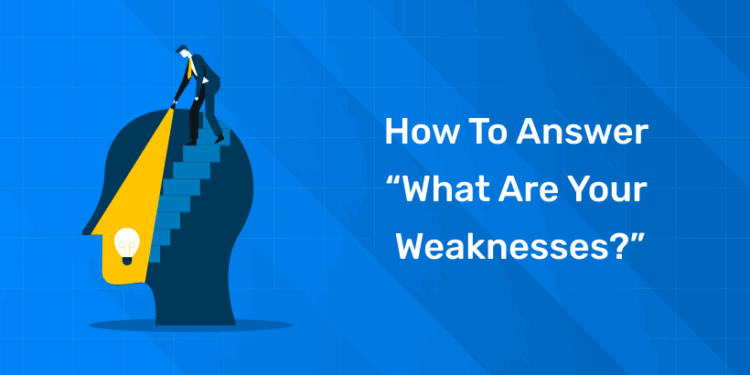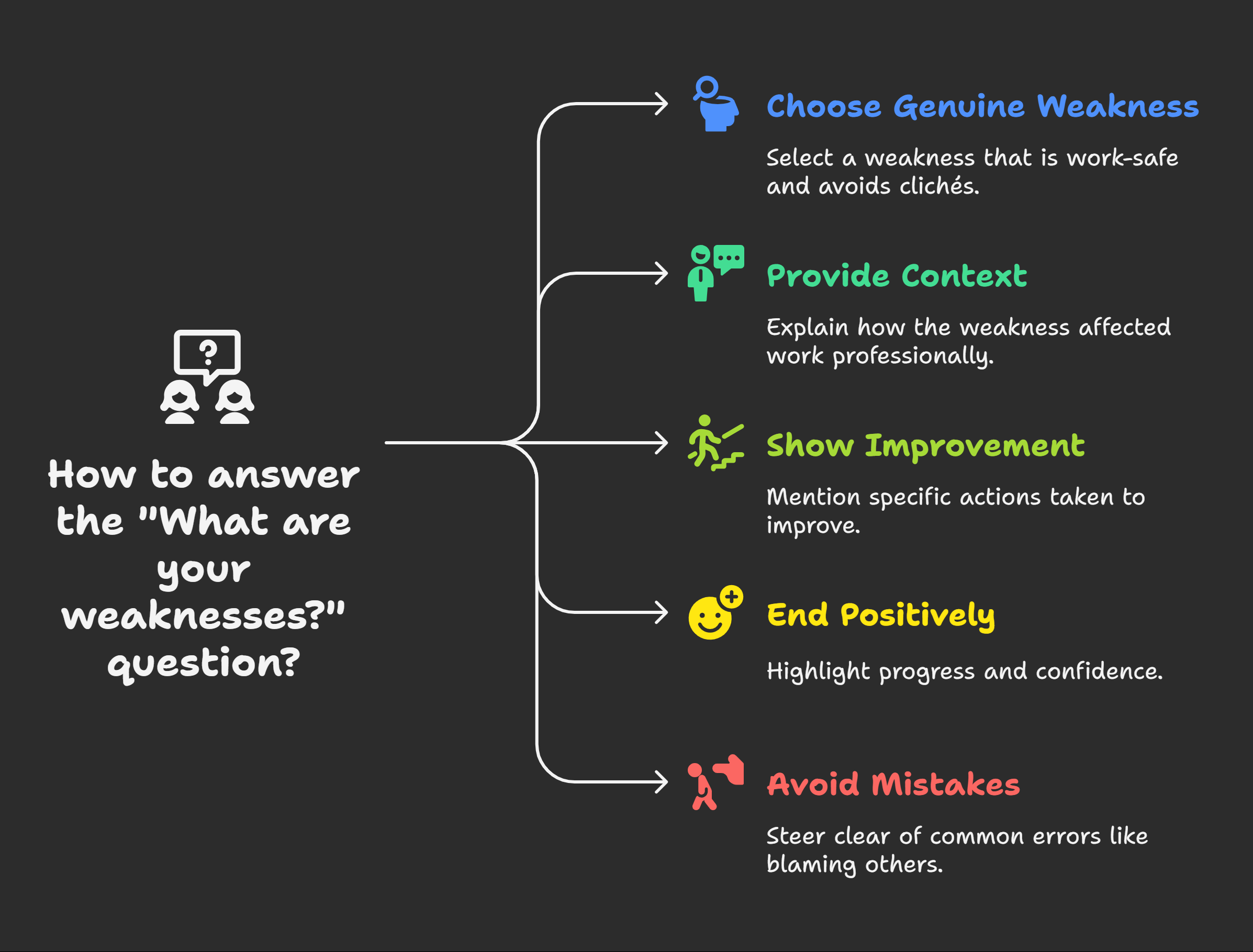Table of Contents
Many job seekers fear this common interview question. It often makes people nervous or confused. Still, you need to answer it clearly. How to answer “What are your weaknesses?” is a skill that matters. A good answer shows growth and self-awareness. You don’t need to act perfect or flawless. Employers want to see honesty and effort to improve. That’s why preparing your response is so important.
This question can appear suddenly in any interview. You might feel stuck or unsure what to say. But with practice, you can answer with confidence. A clear answer shows you’re open to learning. It also proves you handle challenges professionally. That kind of honesty stands out to employers. Let’s learn the best way to respond effectively.
Key Takeaways
-
Choose real but non-critical weaknesses
-
Show steps you’ve taken to improve
-
Keep answers short, honest, and growth-focused
-
Avoid cliché or overly negative responses
-
End on a positive, confident note
-
Practice your answer before the interview
-
Always relate your answer to the job
-
Use this question to show maturity and growth
Begin Your Personality Transformation- Enroll Today!
How to Answer “What Are Your Weaknesses?”: Introduction
Interviews are meant to assess more than just your skills. Employers also look for personality, attitude, and honesty. One question that often makes candidates nervous is, “What are your weaknesses?” It may seem like a tricky or negative question. But in truth, it’s a powerful chance to show self-awareness. You can turn this question into a moment of strength. All it takes is the right approach and preparation. When answered well, it can make a lasting impression.
The interviewer doesn’t expect you to be perfect. They know every person has areas to improve. What matters is how you talk about those areas. Do you reflect on your behavior and choices? Are you trying to improve your skills and habits? Do you accept feedback and grow from it? These qualities are what the question really tests. That’s why learning to answer it smartly is important.
Why this question is commonly asked:
-
Checks your self-awareness and honesty
-
Helps understand how you handle challenges
-
Reveals if you’re open to feedback
-
Shows whether your weakness affects the role
-
Highlights your willingness to improve
-
Indicates if you’re a good team fit
-
Measures your personal and professional growth
-
Tests your ability to stay calm under pressure
Boost Your Skills & Kickstart Your Career!
Employability and Personality Development Course by Entri App: Enhance your communication, confidence, and job-ready skills to excel in your career.
Join Now!Frequently Asked Questions
Why do interviewers ask about weaknesses in the first place?
Interviewers ask this question to understand your self-awareness and honesty. They want to see if you can recognize your flaws and take responsibility for them. It also shows your willingness to improve, which is a valuable trait in any job role. The answer gives them insight into how you handle setbacks, criticism, and professional challenges. This helps them decide if you’re a good cultural and professional fit for their team.
Should I say I don’t have any weaknesses?
No, never say you don’t have any weaknesses. That can come across as arrogant, unrealistic, or unprepared. Everyone has some areas to improve, and employers know that. Instead of trying to look perfect, focus on showing growth. A thoughtful, honest answer will make a much better impression than pretending to be flawless.
What’s a good weakness to mention in interviews?
A good weakness is one that’s honest but not critical to the job. It should be something real and relatable, like public speaking, time management, or being too detail-focused. Most importantly, you must explain how you are improving it. Employers are more interested in your attitude toward growth than the weakness itself. Avoid listing weaknesses that are essential for the role you’re applying to.
How should I structure my answer to this question?
The best structure is simple:
-
Identify a real weakness.
-
Explain how it affected your work.
-
Describe the steps you took to improve.
-
End with the progress you’ve made.
This keeps your answer clear, focused, and positive, helping the interviewer see your ability to reflect and grow.
Can I use a personal weakness not related to work?
It’s better to stick to professional or work-related weaknesses. Sharing something too personal may shift focus away from your skills and job readiness. Also, some personal issues may make interviewers uncomfortable or raise unnecessary concerns. If you choose a personal trait, ensure it’s relevant and presented professionally. For example, “I used to avoid asking questions,” can work if framed in a work context.
What weaknesses should I avoid mentioning?
Avoid weaknesses that directly relate to key skills in the job. For example, if you’re applying for a customer support role, don’t say “I have trouble communicating.” Also, don’t mention weaknesses that suggest laziness, dishonesty, or poor teamwork. Stay away from clichés like “I’m a perfectionist” unless you can explain it in a unique, honest way. Most importantly, avoid saying “I don’t have any” or giving jokey responses.
Is it okay to mention more than one weakness?
It’s best to focus on one weakness in your answer. This allows you to explain it clearly and show your improvement journey in detail. Mentioning more than one might confuse the interviewer or make it seem like you’re trying too hard. If asked for multiple weaknesses, make sure each is different and supported by examples. But in most interviews, one strong, well-developed answer is enough.
What if I’m a fresher and don’t know my weaknesses?
Even freshers can reflect on school, college, or internship experiences. Think about areas where you struggled but improved, like managing group work or asking questions in class. You can also mention soft skills you’re still building, such as confidence or organization. Show that you’re self-aware and open to feedback, even if you lack work experience. That attitude matters more than the weakness itself.
How long should my answer be?
Your answer should be brief but complete — ideally 45 to 60 seconds. Include the weakness, context, actions taken, and improvement. Don’t drag your response or go into unrelated stories. Keep it focused and easy to understand. Practicing it a few times before your interview will help you stay within the right time frame.
How can I practice my weakness answer before the interview?
Write down your answer using the structure we discussed. Say it out loud and check if it sounds natural and clear. You can record yourself or practice with a friend for honest feedback. Focus on tone and delivery — stay calm, confident, and professional. Rehearsing your response helps reduce stress and ensures your message comes across effectively in the real interview.













